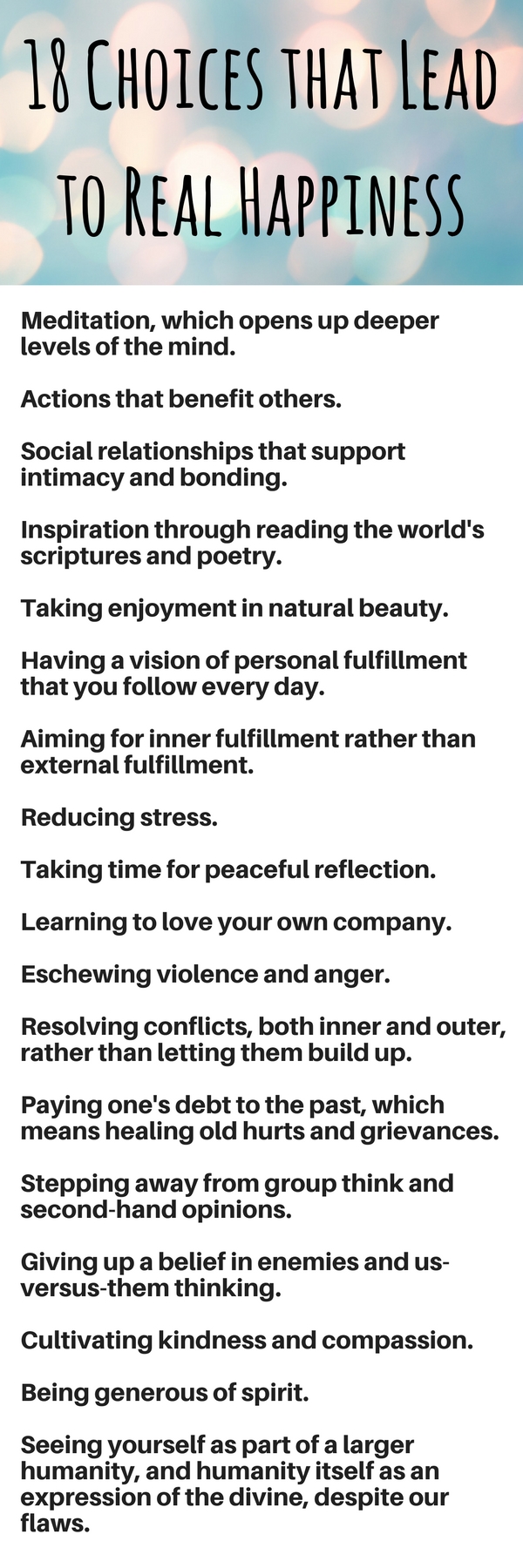Why Choice Is the Way to Happiness
PAGE 3
The other path is called the path of wisdom, which isn't the best term, because it implies the placid state of old men with long, white beards. In Sanskrit there is a better term, vidya, which means knowledge but is more richly defined as "the way to reach the truth." In terms of happiness, the path of vidya would include those choices, values and beliefs that actually succeed in making us happy. If children can be guided from an early age, they can be taught to make such choices. The rest of us will have to unlearn and undo our past errors as a first step.
What Kinds of Choices and Values Lead to Real Happiness?

I'm encouraged that psychology has turned to the positive aspects of the self. But the current findings barely point in the right direction, which is a shame, because the storehouse of the world's wisdom remains locked. Until we unlock it, the state of unhappiness may not grow worse—none of us can predict that one way or another—yet for certain a new kind of happiness will not emerge.
Deepak Chopra is the author of more than 50 books on health, success, relationships and spirituality, including his current best-seller, Reinventing the Body, Resurrecting the Soul, and The Ultimate Happiness Prescription, which are available now. You can listen to his show on Saturdays every week on SiriusXM Channels 102 and 155.
Keep Reading:
Why happiness is so unhappy
7 ways to find joy
What it means to be truly happy
What Kinds of Choices and Values Lead to Real Happiness?

- Meditation, which opens up deeper levels of the mind.
- Actions that benefit others.
- Social relationships that support intimacy and bonding.
- Inspiration through reading the world's scriptures and poetry.
- Taking enjoyment in natural beauty.
- Having a vision of personal fulfillment that you follow every day.
- Aiming for inner fulfillment rather than external fulfillment.
- Reducing stress.
- Taking time for peaceful reflection.
- Learning to love your own company, cultivating the self as a state of being.
- Eschewing violence and anger in all its forms, gross and subtle.
- Resolving conflicts, both inner and outer, rather than letting them build up.
- Paying one's debt to the past, which means healing old hurts and grievances.
- Stepping away from group think and second-hand opinions.
- Giving up a belief in enemies and us-versus-them thinking.
- Cultivating kindness and compassion.
- Being generous of spirit, learning to give.
- Seeing yourself as part of a larger humanity, and humanity itself as an expression of the divine, despite our flaws.
I'm encouraged that psychology has turned to the positive aspects of the self. But the current findings barely point in the right direction, which is a shame, because the storehouse of the world's wisdom remains locked. Until we unlock it, the state of unhappiness may not grow worse—none of us can predict that one way or another—yet for certain a new kind of happiness will not emerge.
Deepak Chopra is the author of more than 50 books on health, success, relationships and spirituality, including his current best-seller, Reinventing the Body, Resurrecting the Soul, and The Ultimate Happiness Prescription, which are available now. You can listen to his show on Saturdays every week on SiriusXM Channels 102 and 155.
Keep Reading:
Why happiness is so unhappy
7 ways to find joy
What it means to be truly happy



